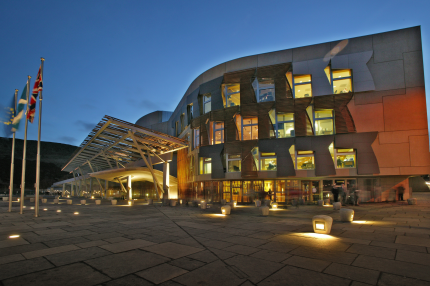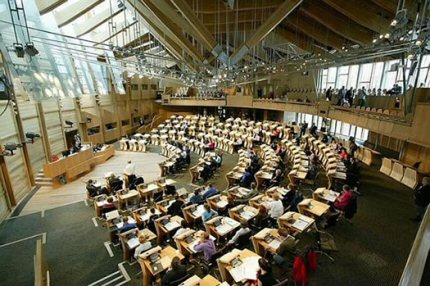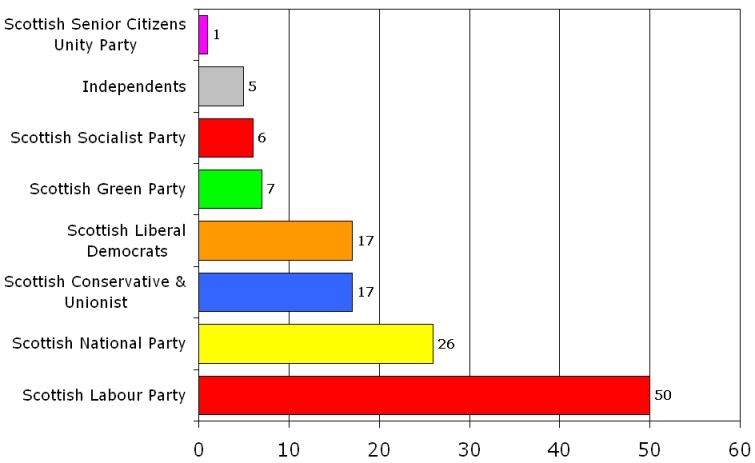

aN oVERVIEW OF THE sCOTTISH Parliament
The new Scottish Parliament building opened for business on the 7 September 2004.
 |
 |
The Scotland Act 1998 gave the necessary legal framework to set up a Scottish Parliament and Executive, which the majority of Scottish people had endorsed in a referendum in September 1997. Of those who voted, 74% supported devolution. On a second question - whether to give the new Parliament tax-varying powers - 64% of voters were in favour. Elections to the first Scottish Parliament for almost 300 years were held in May 1999, and it met for the first time in July 1999.
Unlike the Westminster Parliament, the Scottish Parliament does not have a second chamber to revise legislation which comes before it. Detailed scrutiny of Bills is carried out in committees or by outside experts. The House of Lords no longer considers Scottish legislation on devolved matters (though it remains the final court of appeal in hearing civil cases arising from the Scottish courts).
The Scottish
Parliament’s 129 members (MSPs) are elected for a fixed four-year term. The
‘additional member’ system of proportional representation (PR) is used in
Scottish Parliamentary elections, giving each voter two votes: one for a
constituency MSP and one ‘regional’ vote for a registered political party or an
individual independent candidate
(![]() similar to Hungary).
Of the 129 MSPs, 73 are elected to represent first
past the post constituencies, while the remaining 56 are elected by
proportional representation from eight different electoral regions of
Scotland. The Parliament
elects a First Minister, who heads the Scottish Executive. In theory the
Parliament also elects the members of the Executive, but in practice it is the
First Minister who chooses them. The current First Minister is Jack McConnell of
the Labour Party.
similar to Hungary).
Of the 129 MSPs, 73 are elected to represent first
past the post constituencies, while the remaining 56 are elected by
proportional representation from eight different electoral regions of
Scotland. The Parliament
elects a First Minister, who heads the Scottish Executive. In theory the
Parliament also elects the members of the Executive, but in practice it is the
First Minister who chooses them. The current First Minister is Jack McConnell of
the Labour Party.
The current state of the parties in the Parliament, seats

Devolution means giving power that formerly belonged to the central government to local bodies. This enables decisions to be made at a level closer to the point at which they will have an impact. The devolution settlement means that Scotland has a parliament with ‘devolved’ powers within the United Kingdom. Any powers which remain with the UK Parliament at Westminster are reserved. The Scottish Parliament operates as a self-contained and fully functioning Parliament in its own right. Legislation can be passed by the Scottish Parliament without going through the Westminster Parliament. The UK Parliament at Westminster retains power to legislate on any matter, but the convention of devolution is that the UK Parliament will not normally legislate on devolved matters without the consent of the Scottish Parliament.
Features of the devolution settlement for Scotland
A Scottish Parliament has
The power to pass legislation
The power to alter the rate of tax
129 elected representatives known as Members of the Scottish Parliament (MSPs)
A Scottish Executive comprises:
The First Minister
The Lord Advocate and the Solicitor General (also known as the Law Officers)
Other Ministers appointed by the First Minister
Features of the UK Government and Parliament after Devolution
The Secretary of State for Scotland will remain a member of the UK Cabinet, and will be supported by a new Office.
Scotland will continue to elect MPs to the Westminster Parliament.
Powers of the Parliament
Essentially the powers of the Scottish Parliament are set out by what it does not have legislative competence in rather than in what it can do.
Devolved powers: Education and training; health; local government; housing; economic development; many aspects of home affairs and civil and criminal law; transport; the environment; agriculture, fisheries and forestry; and sport and the arts (these used to be dealt with by the Parliament at Westminster , but are now decided in Scotland)
Reserved powers: International affairs, defence and national security, overall economic and monetary policy, energy, employment legislation and social security (remain with the UK Government and Parliament and are dealt with at Westminster)
The First Minister, normally the leader of the party with most support in the Parliament, heads the Scottish Executive. Since the first elections, the Executive has been run by a partnership between Labour and the Liberal Democrats, with the latter having two seats in the Cabinet, including that of Deputy First Minister. There are 11 Cabinet positions in all.
Finance
Once the budget has been set, the Scottish Executive can share out the resources across its expenditure programmes. The Parliament has the power to increase or decrease the basic rate of income tax - currently 22 pence in the pound - by a maximum of 3 pence. A person is liable to pay income tax if he or she is a UK resident for tax purposes and either spends 50% or more of the tax year in Scotland or has his or her only or principal home there. The Parliament is also responsible for deciding the form of local taxation. I t may, if it wishes, alter both the council tax and business rates.
learn more:
How the Scottish Parliament Works?
sources:
National Statistics, UK 2002, The Official Yearbook of Great Britain and Northern Ireland
Scottish Parliament Official Site
Wikipedia, Scottish Parliament
credits:
The text was composed by using the relevant materials of...
1. The Official Yearbook of Great Britain and Northern Ireland © Crown Copyright 2001.
2. About the Parliament © Parliamentary copyright. Scottish Parliamentary Corporate Body 1999- 2025-2006.
3. Scottish Parliament: Wikipedia The Free Encyclopedia under GNU Free Documentation Licence.